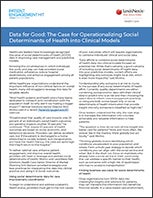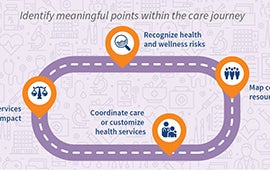Data for Good: The Case for Operationalizing Social Determinants of Health into Clinical Models
Recognizing the positive benefits for both patient engagement and patient outcomes.
In a survey of healthcare CIOs conducted by our business in 2018, more than 50 percent of respondents said that they were not yet using any type of social determinants of health (SDOH) data. Yet SDOH is a critical data set with potentially positive benefits for both patient engagement and patient outcomes.
From medication adherence to preventing readmissions, social determinants of health data is invaluable to continuity of care. Nearly 90 percent of CIOs in our 2020 survey reported using some kind of SDOH data in their organizations, but patient outcomes can vary widely in spite of the quality of care being delivered. This is due to factors such as patient motivation to be actively involved in their own care and their surrounding environment and economic situation.
So, how do you appropriately integrate these data sets into clinical models and apply them to care plans to transform patient outcomes for the better? Clinically-validated data can be more valuable than patient reported surveys or EHR data.
Find out where to start in utilizing SDOH for optimal patient care by watching our webinar below.



